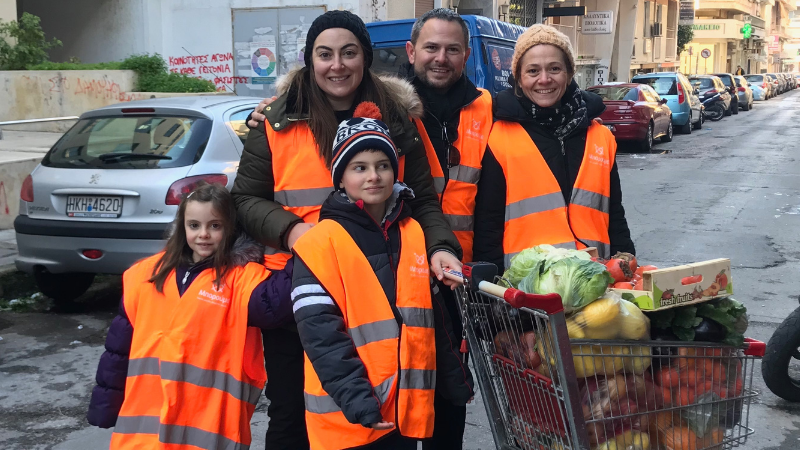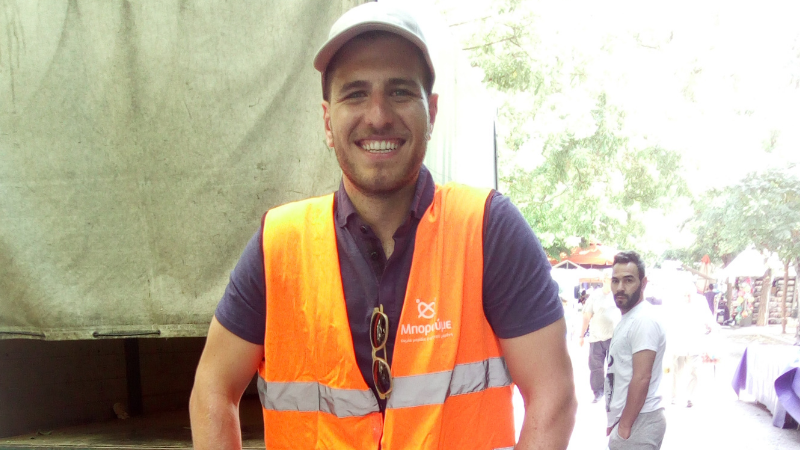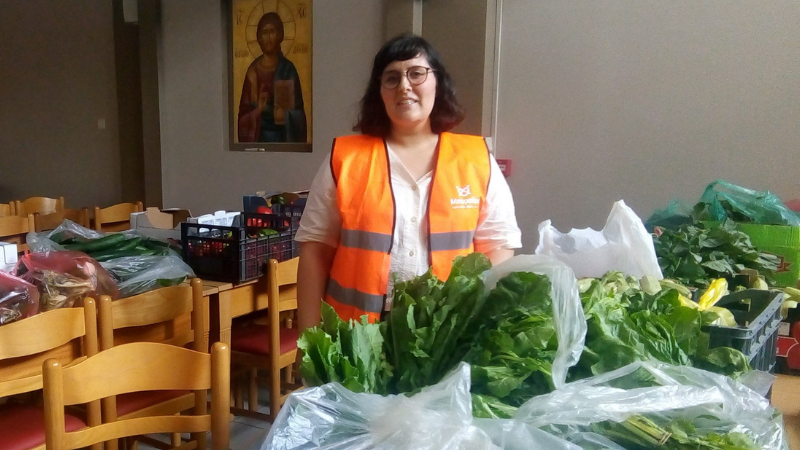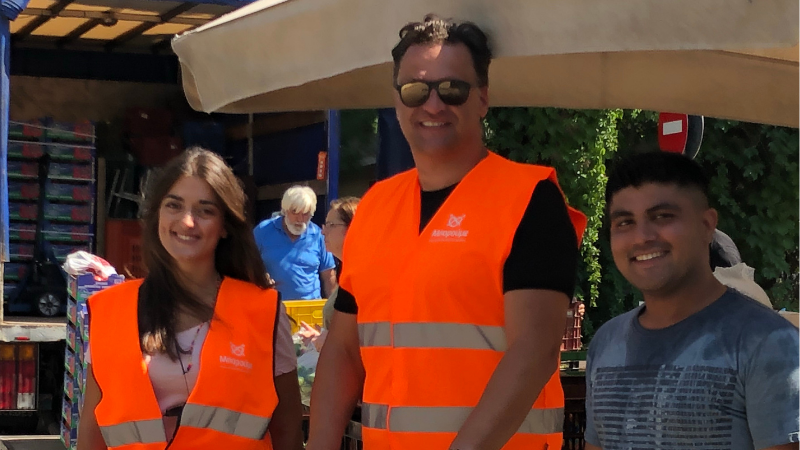The diaspora in action: Meet the Greek Australians giving back to the mother country
October 28, 2019
By Anastasia Tsirtsakis
Published in Neos Kosmos
It was former diplomat, Professor Kishore Mahbubani who said “sometimes you need a major crisis to bring people together”. This couldn’t be truer for Greece and the diaspora.
With the onset of the financial crisis, concern grew among Greeks abroad for those in the mother country, with many searching for ways to help.
One grass roots example that developed out of growing need was Boroume’s Farmer’s Market Program.
Funded by The Hellenic Initiative (THI) Australia, the program was launched in 2015, under the premise of collecting fresh produce that would otherwise be going to waste from local markets, and donating it to charities with the help of volunteers, open to both locals and those travelling to Greece.
It started with a couple of markets in Athens, and has the capital alone, and has extended to Thessaloniki with an additional six markets. Another seven are expected to come on board over the next 12 months. Unlike the traditional food bank model, the program is all about fresh food. To give some perspective on the impact, both for those in need and the environment, in 2018 Boroume collected more than 130 tonnes of fresh market produce for distribution to local charities.
“It’s very much a collective effort between the traders, Boroume and the charities; they do an amazing job,” THI Australia Program Manager, Victoria Kyriakopoulos told Neos Kosmos.
“They’ve created communities by connecting donors with recipients. From theyiayia who’s got extra pastitsio and letting her know that there’s a charity down the road, to the Japanese embassy having a function and wanting to donate any left over food.”
Volunteers are only required to give a minimum two hours of their time, are not required to speak Greek, and don’t have to have a special skill, and as a result the program has had broad appeal, including Greeks of the diaspora from young people and families, to seniors, who want to incorporate philanthropy on their holidays.
“Not everybody can donate money, not everyone can donate an intern position or the other things we ask of people, so for your average punter going to Greece, it is a wonderful way to connect. Plus people love the fact that it’s real, it’s tangible, you see what’s been donated, you see the generosity of the traders, appreciation of the recipient organisation and you know where it’s going and that’s a joy,” said Ms Kyriakopoulos.
While Greece’s economy has taken a turn for the better, with projected growth for the next 12 months, Ms Kyriakopoulos says philanthropy from the diaspora is still important as ever.
“There’s certainly a lot of ongoing need in Greece with programs like this one, and that need hasn’t changed in the last few years – if anything, it’s increased. There’s so much work being done by these groups, important and impactful work.”
To find out more about volunteer opportunities, visit https://au.thehellenicinitiative.org/what-we-do/1089-2/

THEODORA GEORGATOS Volunteered January, 2019
What motivated you to volunteer in Greece?
I am a Greek Australian and my husband is Greek American. We were raised in strong Greek communities in our respective countries and both lived and studied in Greece in our university years. In late 2018 I became aware of The Hellenic Initiative (THI) and was intrigued by the idea of diaspora Greeks helping their fellow Greeks back in the homeland through crisis relief, volunteer programs and internships.
After researching THI Australia I found that one of the non-profits they supported was Boroume … Reading the testimonials of previous volunteer participants was inspiring enough for me to volunteer in the Sydney THI office to help increase volunteer numbers for Boroume through social media campaigns.
In early 2019 my family and I were planning to be in Greece so we volunteered … We travel to Greece almost every year and have tried to find volunteer opportunities but it was never easy to find ways to volunteer our time. We were of course supporting the economy by spending money there, but being of Greek background we wanted to contribute in a more meaningful way and expose our kids to the Greece beyond the Acropolis and beaches. The Boroume Farmer’s Market Program was the perfect fit for our family.
What is most memorable about your experience?
The most memorable thing about our experience was that our group collected approximately 200 kgs of fruit, vegetables and even a few fish which was then divided amongst 30 families in need in the neighbourhood we collected from. The only reason Boroume collected from this market on this day was because seven of us from Sydney were willing to volunteer. Without us, those families wouldn’t have received all that food to start the new year off in a positive, healthy way.
Did anything surprise you while volunteering?
How readily and generously the Greek market stall holders donated produce, as I imagine that many of them are also affected by the economic crisis.
Leaving Greece, what did you come away with? Would you volunteer your time again?
That the crisis has given birth to some inspiring non-profits like Boroume who are not only trying to help the Greek people with crisis relief, but also encourage civic engagement. I would definitely volunteer our family’s time again.
Would you encourage others to volunteer their time?
Definitely, because anyone can volunteer regardless of age (our daughter is the youngest Australian volunteer at age six!), background, ability to speak Greek, etc. It is a short time commitment but makes a huge impact on the recipients. For Greek Australian families in particular I would recommend that they participate with their children to encourage that philanthropy towards the Greek people and strengthen the connection of the diaspora for future generations.
What is your hope for Greece and its people post-economic crisis?
That there is hope for the future so that educated, innovative and civic-minded youth stay and thrive in Greece and put an end to [the] Brain Drain.

YANNI KAILIS Volunteered 2017, 2018 & 2019
What motivated you to volunteer in Greece?
The Hellenic Initiative introduced me to Boroume when their founder Alex visited Perth. What struck me was the sheer number of portions and tonnes of food Boroume were collecting every week, month and year. Boroume’s mission was simple but so necessary given what Greece was going through at the time. Alex’s honesty and perspective on the situation in Greece inspired me to get involved.
What is most memorable about your experience?
I had the opportunity to work with many members of the Boroume family which gave me a greater understanding of the impact they were having on local communities. After listening to Alex speak on his first visit to Perth and later during volunteering with Anna and Alia, it was easy to see the common goal shared by everyone at Boroume. They all truly believe in what they are doing and it was inspiring.
Did anything surprise you while volunteering?
The willingness of those at the farmer’s markets to donate food was fantastic to see. Even in a time where they must look after their own families, their generosity to help provide for those that need it most was heart-warming. Boroume has developed a strong reputation with each of the markets which has given sellers great confidence knowing their food will go to a good place.
Leaving Greece, what did you come away with? Would you volunteer your time again?
Leaving Greece is always sad but it’s nice to know there are the likes of Boroume doing what they do. Without doubt it is the Boroumes of the world that help keep a country afloat and for this reason I can’t wait to volunteer next time.
Would you encourage others to volunteer their time?
Philhellenes from all around the world travel to Greece to enjoy all our patrida has to offer, but it’s important not to ignore the everyday struggle the country is in. It’s easy for us to swim in the crystal clear waters, eat the incredible food and get lost in all of Greece’s beauty. But the next generation won’t ever get to experience this if we don’t in our own way contribute to the crisis. Organisations such as Boroume make it very easy for us to make a difference and help give back to the country we love so much. I most definitely recommend others volunteer on their next visit to Greece.
What is your hope for Greece and its people post-economic crisis?
The new government is a step in the right direction and I think there is cause to be optimistic. More recently, I have noticed a positive shift in the minds of the Greek people who are finally starting to see the exit from what has been a very tough period. My hope is that Greece continues to look forward and not back and to learn from its mistakes. Both the government and private sector have a key role to play in encouraging the next generation of entrepreneurs, and to ensure business comes back to Greece to help grow the economy and create jobs.

EFFIE KARAGEORGOS Volunteered in June 2019.
What motivated you to volunteer in Greece?
My friend Kyriakos Gold had volunteered through the Boroume project, and he had posted on social media about it. Knowing I was going to be travelling to Greece soon, I asked him how I could be involved.
I am a Greek Australian woman. I visit Greece around every year and I have seen the progressive long-term effects of the crisis on Greek families, and I’ve also seen that Greeks have been among the most generous and hospitable populations when dealing with refugees coming from war torn Middle Eastern countries, despite the economic effects of the crisis on them. So basically, I wanted to help my Mother country beyond my own family and friends.
What is most memorable about your experience?
I helped out in two farmers markets … this involved going through the market with trolleys and collecting fruit and vegetables from any sellers who were willing to give it to us … There were a few people who came up and asked us what we were doing, and although it was likely that these people were suffering financially themselves, there was no negativity at all. They would tell us what a wonderful thing we were doing, and were always encouraging. They would mention that things were difficult, people were not buying fresh produce and how hard things were. This made me think that perhaps we would not be able to get much produce for the charity and those in need. I should have remembered that these are Greeks and that generosity and kindness is part of the national personality … I was just pleasantly shocked that we were offered so much, and the stallholders were so kind and lovely. It is very rare to find people who are going without themselves, but will still keep on giving. I think that epitomises the Greek character, that will continue to be generous despite the obstacles and financial difficulties the crisis throws at them.
Leaving Greece, what did you come away with? Would you volunteer your time again?
I am planning to contact Victoria and Anna again next year if I am able to visit Greece. I spend most of my time in Greece with family and friends, and this helped me broaden my view of Greece as a society where my roots belong but from which I have so little first-hand experience. Visiting beaches and the tourist spots is one thing, spending time with family in villages and towns is another, but this helped me see another side to Greece. I really treasured those days and these experiences. I am a historian and am very interested in human societies, and particularly that from which Greek Australians, the diaspora, came. This helped me understand that a little better.
Would you encourage others to volunteer their time?
Whether you are Greek or not, I cannot emphasise how valuable it was to me to experience the generosity of the stallholders, know I was helping people in need and exploring parts of Athens I had never visited before. I definitely recommend this experience.
What is your hope for Greece and its people post-economic crisis?
Historically, the Greek people have survived so many crises and will survive this one. I hope that the future post-crisis can bring a fairer political and economic system for all classes of people. Greece is a small country geographically, but one which has impacted the world far more than many other larger nations, for millenia, and will continue to do so.

PETER NIKOLAKOPOULOS Volunteered in August 2018.
What motivated you to volunteer in Greece?
My mother always believed we should give back to the community, and this was instilled in me from an early age. So I took this opportunity to do my bit to help others in need. This program appealed to me on two fronts: it reduced food waste by collecting the excess stock (in addition to food donations) from the fresh food markets, and from this produce we were able to deliver home-style cooked meals to the homeless. I felt this was an amazing program, and was delighted to be a part of it.
What is most memorable about your experience?
The satisfaction of being a part of such a great cause, and knowing that people in need were getting the benefits.
Did anything surprise you while volunteering?
Mixed emotions. Positive – doing something to help, albeit a small role in that large problem. Negative – to see just how many people are living under the poverty line and how lucky and fortunate we are in Oz.
Leaving Greece, what did you come away with?
That I’d like to help or be more involved in more programs like this.
Would you encourage others to volunteer their time?
Yes I would – and have already shared my experiences with others, highly recommending it. It’s a great reality check and I think others too will get a lot out of it, highlighting what is important in life.
What is your hope for Greece and its people post-economic crisis?
I’d like to see the people of Greece able to live a happy and prosperous life, and Greece return back to its former glory.